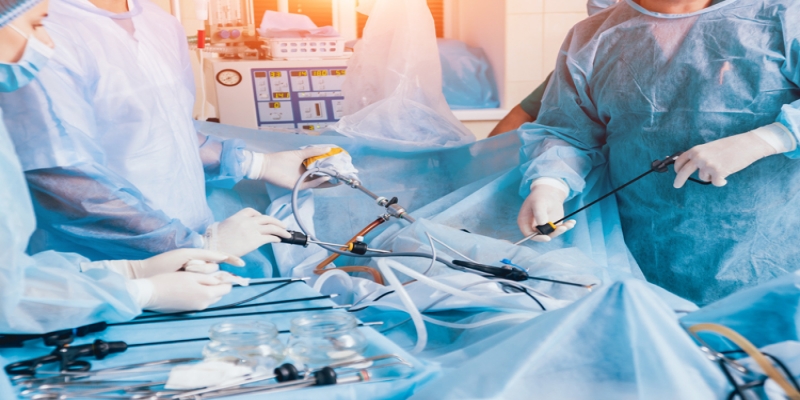Recovery Tips and Tricks After Laparoscopic Hernia Surgery
2024-04-04 / RG STONE HOSPITAL / Hernia Repair

Introduction: Undergoing any surgical procedure, including laparoscopic hernia surgery, can be a daunting experience. However, with advancements in medical technology, procedures like laparoscopic hernia surgery have become increasingly common and generally offer quicker recovery times compared to traditional open surgeries. While the surgery itself is minimally invasive, the recovery process requires careful attention and adherence to certain guidelines to ensure a smooth and successful healing journey. In this blog, we'll delve into essential tips and tricks to help you navigate through the recovery period after laparoscopic hernia surgery.
Understanding Laparoscopic Hernia Surgery
Laparoscopic hernia surgery, also known as inguinal hernia laparoscopic surgery, involves repairing a hernia through small incisions in the abdomen using a laparoscope—a thin, flexible tube equipped with a camera and surgical instruments. This minimally invasive approach offers several benefits, including reduced postoperative pain, shorter hospital stays, and faster recovery times compared to traditional open surgeries.
Recovery Timeline: Before diving into recovery tips, it's crucial to understand the typical timeline for recovery after laparoscopic hernia surgery. While individual experiences may vary, the following timeline provides a general overview:
-
Immediate Postoperative Period (Days 1-2): You'll likely spend a few hours in the recovery room after surgery for observation. Pain and discomfort are common during this period, but medications prescribed by your doctor will help manage it.
-
First Week: During the first week, focus on resting and gradually increasing your activity level as tolerated. You may experience mild soreness, bruising, and swelling around the incision sites.
-
Weeks 2-4: As you progress through the second to fourth weeks, you'll notice a gradual improvement in your energy levels and mobility. Follow-up appointments with your surgeon may be scheduled to monitor your progress.
-
Months 1-3: By the end of the third month, most patients are able to resume their normal activities, including work and exercise, with minimal restrictions.
Recovery Tips and Tricks:
-
Follow Your Surgeon's Instructions: Your surgeon will provide specific postoperative instructions tailored to your individual needs. It's crucial to follow these instructions diligently, including taking prescribed medications, attending follow-up appointments, and adhering to activity restrictions.
-
Manage Pain and Discomfort: While some degree of pain and discomfort is normal after surgery, it can be managed effectively with pain medications prescribed by your doctor. Additionally, applying ice packs to the incision sites can help reduce swelling and alleviate discomfort.
-
Gradually Increase Activity: Avoid strenuous activities and heavy lifting during the initial recovery period. Instead, focus on gentle movements such as walking to promote circulation and prevent blood clots. As you progress, gradually increase your activity level based on your surgeon's recommendations.
-
Maintain a Healthy Diet: Eating a balanced diet rich in nutrients can support the healing process and prevent constipation, which is a common side effect of pain medications. Stay hydrated and incorporate fiber-rich foods such as fruits, vegetables, and whole grains into your diet.
-
Practice Proper Wound Care: Keep the incision sites clean and dry to prevent infection. Follow any specific wound care instructions provided by your surgeon, such as changing dressings or applying topical ointments.
-
Listen to Your Body: Pay attention to your body's signals and avoid pushing yourself too hard, especially during the early stages of recovery. Rest when needed and don't hesitate to seek medical attention if you experience any concerning symptoms such as persistent pain, fever, or excessive swelling.
-
Stay Positive and Patient: Recovery from laparoscopic hernia surgery takes time, and it's normal to experience ups and downs along the way. Stay positive, trust the healing process, and be patient with yourself as you gradually regain strength and mobility.
Conclusion: Recovering from laparoscopic hernia surgery requires patience, perseverance, and proper self-care. By following the tips and tricks outlined in this blog and working closely with your healthcare team, you can navigate through the recovery period with confidence and achieve a successful outcome. Remember to prioritize rest, listen to your body, and celebrate each milestone along the road to recovery.
Categories
Hernia Repair
Appendicitis
Piles
Urological Treatment
Hernia treatment
Enlarged Prostate (BPH)
Gall Bladder Stone
Urinary / Kidney Stone
Vitamins
Indian Health Care System
Exercise
Obesity
Female Urinary Incontinence
Single Incision Laparoscopic Surgery (SILS)
Kidney Cancer
Bladder Cancer
Ovarian cancer
Nephrology
Bariatric Surgery
Kidney Function Test
Female Urology
Radiation Therapy
Alcoholic Fatty Liver
Liver disease
Gastroenterology
Kidney Disease

